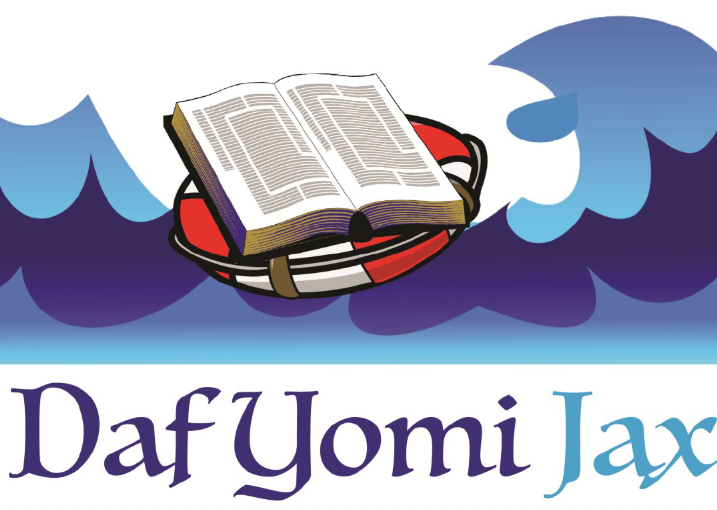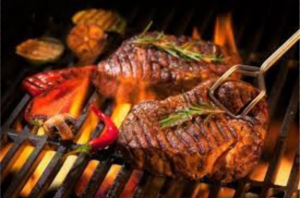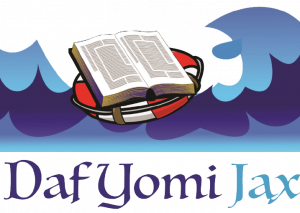Pesachim 69-75
פסחים ס“ט - ע“ה

From the Desk of Rabbi Yaakov Fisch
 It was another terrific week of learning. Our studies in the Daf this week took us to the grill. The topic of roasting the Pe-sach sacrifice was a primary topic over the course of the week. There is a certain excitement we have when firing up the grill to some steaks on it. The cuisine of על האש is quite popular, especially in Israel. The Pesach offering was lamb, which was roasted, and the Gemara details many of the different halachic aspects of the roasting and grilling. I hope and pray that our involvement with the Pesach offering will go from the academic to the practical.
It was another terrific week of learning. Our studies in the Daf this week took us to the grill. The topic of roasting the Pe-sach sacrifice was a primary topic over the course of the week. There is a certain excitement we have when firing up the grill to some steaks on it. The cuisine of על האש is quite popular, especially in Israel. The Pesach offering was lamb, which was roasted, and the Gemara details many of the different halachic aspects of the roasting and grilling. I hope and pray that our involvement with the Pesach offering will go from the academic to the practical.
Have a Peaceful Shabbos,
Rabbi Yaakov Fisch
Pesachim 69
A Bris Milah may be performed on Shabbos if the baby is eight days old on Shabbos. (If the original Bris was postponed, the Bris may not be performed on Shabbos.) The Gemara quotes the dispute if a Melacha may be performed to prepare for the Milah. For example, can the knife be carried in the public domain on Shabbos in order to perform the circumcision? According to Rabbi Eliezer, it would be permitted and Rabbi Akiva disagrees and says that it would be forbidden to do on Shabbos. The Gemara rules in accordance with Rabbi Akiva if the preparation for Milah could have been per-formed before Shabbos. That is the ruling of the Shulchan Aruch in Ch. 331:6 of the Laws of Shabbos that the preparations of Milah cannot override Shabbos. This would apply even if the prohibition was only a rabbinic prohibition, i.e. one would need to carry the knife not through a public domain but rather through a karmelis. One cannot violate a rabbinic prohibition on Shabbos in order to prepare for the Milah. Based on this it is questioned what to do with the knife once the Milah has been concluded. Generally, we refer to the Milah knife as Muktze since the knife is considered very valuable. How then can the Mohel move the knife once the Milah has been concluded? The Taz
in Ch. 310 of Shabbos rules that the knife is considered Muktze and should be kept in the room of where the Milah occurred and not be removed. The Magen Avraham says that although it is muktze, one may put the knife away after the conclusion of the Milah (as long as he has not put down the knife yet) to whichever location he desires. The Mishna Berura in Ch. 310:15 summarizes this discussion and these are his words.
כתב הט”ז איזמל שמל בו בשבת אין
לטלטלו אחר המילה דהא מוקצה הוא מחמת חסרון כיס
דהא אדם מקפיד שלא להשתמש בו דבר אחר ודלא
כהמקילין לטלטל אותו מטעם דאין מוקצה לחצי שבת
דהא בין השמשות ג”כ היה מוקצה מחמת חסרון כיס ואין
לטלטלו אז לשום דבר וע”כ אע”פ שעומד למחר למלאכת
מילה מ”מ אחר גמר צורך שלו חוזר לאיסור טלטול של
בין השמשות ע”כ יצניעו באותו חדר שהוא מל שם
והמ”א בסימן של”א סק”ה מסכים עמו ג”כ בעיקר הדין
אך דעתו שיש להחמיר שבעוד שהאיזמל בידו לא יניחנו
מידו עד שיניחנו במקום המשתמר או שיוליכנו לביתו
דכל מוקצה שהוא בידו מטלטלו לאיזה מקום שירצה
וכדלעיל בסימן ש”ח ס”ג.
Pesachim 70
The Mishna says that the Chagigah is brought on the 14th of Nissan can only be offered if it was during the week-day, most of Israel was in a state of purity, and there was sufficient meant for the Pesachim to feed everyone. The Gemara on 70b learns the source from a verse in the Torah why the Chagigah could not be brought on Shabbos. There is a practical halacha that is relevant to the Pesach Seder based on the halacha that the Chagigah could not be brought on Shabbos. The blessing at the end of the section of Maggid that includes the words מן
הזבחים ומן הפסחים . That is a reference to the Chagigah brought on Erev Pesach, which was followed by the Pesach. The Acharonim quote the Mahari Weil that if the first night coincides with Motzai Shabbos (as this year of 5781), one would not be able to say the Bracha in this manner as the Chagigah was not brought on Shabbos of the fourteenth of Nissan. Instead one would have
to say the inverse text of מן
הפסחים ומן הזבחים . The Mishna Berura in 473: 72 of the Laws of Pesach quotes the Mordechai who states that one should always say the text of מן הזבחים ומן
הפסחים irrespective of what night of the week the night of the Seder coincides with. These are the words of the Mishna Berura: כתב
המרדכי דצ”ל ונאכל שם מן
הזבחים ומן הפסחים דהא אוכלין תחלה מן החגיגה
דהיינו הזבח אבל הפסח נאכל על השובע . The Shar HaTzion in 473:80 explains this practice of al-ways saying מן הזבחים ומן הפסחים even if the first night of the Seder coincides with Motzai Shabbos. He justified this by saying that the intent of the blessing was not necessarily referring to that night. Rather, it’s a prayer that longing for the future. Both the Chagigah and the Pesach will be brought in general on Erev Pesach in the future and that is what we are praying for and that is the intent of the Bracha.
Pesachim 71
The Gemara states that one cannot bring a Shelamim sacrifice on Erev Yom Tov to fulfil the Simcha obligation of Yom Tov or the Chagigah obligation. One cannot fulfill Simcha’s obligation because time for Simcha is on Yom Tov and not before Yom Tov. One cannot satisfy the obligation of Chagigah because since the Chagigah is an obligatory sacrifice, one cannot use a consecrated item to fulfill a previous obligation. One must use unconsecrated funds for an established obligation. Based on this concept of the requirement of using unconsecrated funds for an existing obligation,
can one use money from Maaser for gifts to the poor (Matanas L’evyonim) on Purim? The Magen Avraham in Ch. 694:1 in the laws of Purim quoting the Mahril states that one cannot use the money of Maaser funds for Matanas L’evyonim or gifts to the poor. The reason is based on our Gemara that if one has a previous halachic obligation, he may not use consecrated funds for that obligation. These are the words of the Magen Avraham:
משלו ולא משל מעות מעשר ]של”ה[ ואם בא להוסיף
מוסיף משל מעשר ]מהרי”ל בתשו’ סי’ נ”ו[
Pesachim 72
Rabbi Eliezer and Rabbi Yehoshua have a dispute if someone is endeavoring to perform a Mitzvah and, in the process, violated a pro-hibition from the Torah. According to Rabbi Eliezer, one would be liable for violating the prohibition and, if necessary, bring a sin offering to atone for the sacrifice for the action. However, Rabbi Yehoshua disagrees and says that since one is in pursuit of performing the Mitzvah he would be exempt from violating the Torah’s prohibition. This is called טעה
בדבר מצוה . It’s important to note that Rabbi Yehoshua only exempts one because of טעה
בדבר מצוה in a situation where the Mitzvah was actually performed. This applies if the baby circumcised was nine days old or was sup-posed to have his Bris the previous day. However, if the Mitzvah was not performed at all i.e. the Bris was performed on the seventh day or the baby was supposed to be circumcised on Sunday — then even Rabbi Yehoshua would not advocate that one is exempt from the violation because of טעה בדבר מצוה . It would seem evident from this discussion that if a baby was circumcised before the eighth day, he would not have fulfilled a mitzvah. In a situ-ation where one has not fulfilled the Mitzvah of
Milah but was already circumcised (i.e., a convert that was already circumcised), one must take a drop of blood out of the area of the Milah. Surprisingly, the Rema in Ch. 262:1 in the Laws of Milah states in the name of the Rosh that if a baby was circumcised before the eighth day, he fulfills the Mitzvah. This seems in direct contradiction based on our Gemara, which states if one did the milah on a seven-day-old baby, he would have brought a chattas as not Mitzvah was performed and it’s not a טעה בדבר מצוה !!! The Beis Halevi introduces an amazing chiddush on this topic. He says that there are two aspects to the Mitzvah of Milah. One is the act of circumcision, and one is the status of being circumcised. The latter is independent of the former. One fulfills the Mitzvah of Milah every moment of his life merely for being circumcised. In this case, one does not fulfill the first aspect of Milah for circumcising a seven-day-old baby on Shabbos. However, once this baby reaches eight days old, his status is of being circumcised, and therefore there is no hatafas dam bris required since the baby’s status is of a circumcised per-son.
Pesachim 73
One of the fundamental rules in the Laws of Shabbos that for something to be considered “work”, it must be creative and not destructive. If the act is destructive, it does not fall into the category of “work” on Shabbos because we learned that out of the Mishkan, all the work that was done there was creative and not destructive. Based on this, the Gemara questions how if one slaughtered the Pesach that was invalid i.e., it was designated for people that couldn’t eat it — how can one be liable for violating the prohibition on Shabbos? The act of slaughtering was not a creative act — since the shechita was invalid and it was a destructive act!! This is known as מקלקל בחבורה פטור . (If the shechita was valid, it can be considered crea-tive despite that the animal lost his life since it can be eaten or goes to the altar.) The Gemara responds that it is considered creative because if it was taken up to the altar, it doesn’t need to be removed. The Gemara challenges this premise in presenting various examples where the shechita was not valid and why there should be a liability on Shabbos if it were not a creative act. The final example is a case when someone slaughtered an animal that was previously designated as a sin offering on Shabbos for the sake of an idol, and it was outside the Temple. He is liable for three prohibitions
(Shabbos, Idolatry, and slaughtering outside the Temple). The Gemara questions, how can one be liable for Shabbos– how can this action be considered creative and not destructive? The Gemara responds that it is creative in the sense that it is no longer have the prohibition of אבר מן החי . That means if an animal is not slaughtered, it is prohibited to eat meat from it, but now that its at least slaughtered (although there were other prohibitions involved) it’s no longer אבר מן החי . What practical benefit is it that its no longer אבר מן החי ? It is still something that is forbidden for many reasons!! According to Rashi, it makes a difference for a non-Jew. That is because a non-Jew is prohibited from eating אבר מן החי since its one of the Noahide laws. Now that its slaughtered its no longer אבר מן החי and a non-Jew may eat it. There is another view on what makes this a creative act. That is the position of Rabeinu Chananel. He says that before the shechita the quantity for the prohibition of אבר מן החי was not just a kezayis of meat but a kezayis of any combination of meat, bones or sinews. Now that the prohibition of אבר מן החי has been removed with this shechita, the kezayis is only form the meat and can’t be comprosed of any-thing else.
Pesachim 74
Rabbah stated that meat still had blood in it and was used as a filler in other meat (or chicken) that also contained blood (as it wasn’t broiled or salted yet). If roasted together it would be permissible to eat as even though it absorbs the blood, it can also have the blood purged out through the same heat source. Rashi comments that although the primary source of the blood extraction is the roasting on the fire, nonetheless, one should still lightly salt the meat before broiling. Tosfos objects to the position of Rashi. Tosfos argues that if one is going to extract the blood through roasting, it would be unnecessary even to salt it lightly. He brings proof from the kashering of
the liver. In the case of the liver, one is permitted to eat it after broiling, and no salting is necessary at all. That is the ruling of the Shulchan Aruch in Ch. 76:1 in the laws of Yoreh Deah. However, Bach says that ideally, one should be machmir for something that will be roasted and have it lightly salted before roasting it on the fire. These are the words of the Shulchan Aruch:
הַצְּלִי אֵין צָרִיךְ מְּלִיחָה, לְּפִי שֶׁהָאֵש
שוֹאֵב הַדָם שֶׁבּוֹ מֵעַצְּמוֹ
The Bach adds the following words:
מיהו לכתחלה נהגו למולחו קצת
כפירש”י לשם בשכבר נתחב בשפוד וצולין אותו מיד
שלא יתמלא המלח דם כ”כ מהרא”י בהגהת ש”ד סימן
ט
Pesachim 75
הפת מותרת א"ל והאמר רב חיננא סבא אמר רבי אסי אמר רבי יוחנן תנור שהסיקו וגרפו וצלה בו את הפסח אין זה צלי אש
שנאמר )שמות יב( צלי אש )שמות יב( צלי אש שתי פעמי' טעמא דגלי רחמנא צלי אש צלי אש שתי פעמים הא לא גלי רחמנא
הוי אמינא צלי אש הוא א"ל גלי רחמנא התם וילפינן מינה ואי בעית אימא התם טעמא דכתב רחמנא צלי אש שתי פעמים הא לא
כתב רחמנא צלי אש שתי פעמים הוה אמינא אאש קפיד רחמנא ואפילו גרפו נמי צלי אש הוא אבל הכא אעצים דאיסורא קא
קפיד רחמנא והא ליתנהו
If an oven has a heat source that has been re-moved but the oven is still hot from the heat source — would that be considered that it is still heated from the heat source? There are a few examples discussed in our Gemara. One application is an oven that no longer has the actual fire in it but remains hot. The Gemara says that one would not be able to roast the Pesach in that oven. The stated reason is that the Torah states the words צלי אש repetitively. This is to teach us that the oven must be heated in an oven with an actual fire present, and it is not adequate if the stove is still hot from the heat source but the source is no longer there. It’s apparent from the sugya that the Pesach is unique because of the repetitive expression of צלי אש
However, in other instances, it would be adequate for something to be considered roasted or צלי even if the heat source is no longer present. The poskim want to argue based on this that an oven that is on broil mode is appropriate to Kasher liver. As we discussed, the only method for kashering liver is to roast it on fire. The salting of the liver would not be sufficient as there is a high concentration of blood. Many prominent agencies advise based on this Gemara that it would be appropriate to broil liver in a modern oven. Please be aware that there are other stipulations in kashering liver and beyond the scope of this comment. I am just focusing on the heat source that would be appropriate to kasher the liver.
Weekly Quiz
-
1. What are the three conditions for the Chagigah to be brought on the fourteenth of Nissan?
-
2. What was the dispute between Ben Durtai and the Sages?
-
3. What was the reasoning of Ben Durtai and the Sages?
-
4. Please explain the case of the dispute between Rabbi Eliezer and Rabbi Yehoshua if a Pesach was brought on Shabbos.
-
5. What is the case of the dispute Between Rabbi Eliezer and Rabbi Yehoshua if a Milah was done on Shabbos?
-
6. When does Rabbi Meir admit that we would not apply the concept of טעה בדבר מצוה ?
-
7. How can one be liable for violating a prohibition of Shabbos by bringing an invalid sacrifice? Isn’t that מקלקל בחבורה ?
-
8. Why can’t a metal skewer be used to roast the Pesach?
-
9. Please explain the concept of כבלעו כך פולטו ?
-
10. If an oven had a fire in it and the fire was removed and the oven is still hot. Can the Pesach be roasted in that oven? What is the source for that?
